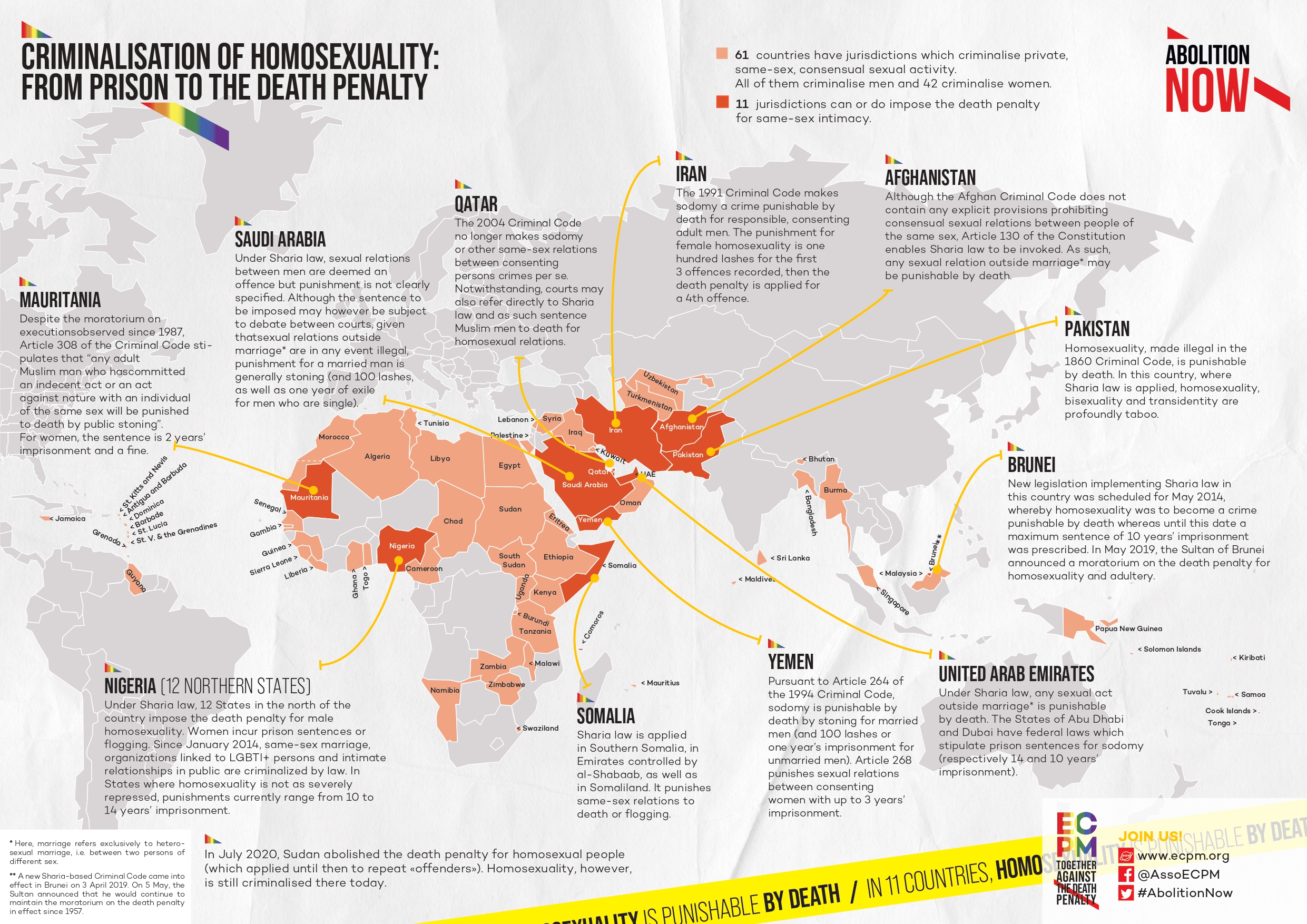ECPM calls on all countries to respect everyone’s sexual freedom
With this campaign, ECPM denounces sexual discrimination and urges countries that sentence people to death on the grounds of sexual orientation to decriminalise it. ECPM also denounces countries with openly homophobic legislation. Since 2005, ECPM has joined the Paris Pride March in support of the LGBTQIA+ community.
Campaign design: Marty Planchais
12 countries apply the death penalty for homosexuality
12 countries in the world still have laws providing for the death penalty for homosexuality: Afghanistan, Brunei, Iran, Mauritania, Nigeria, Pakistan, Qatar, Saudi Arabia, Somalia, United Arab Emirates and Yemen (Sudan, which amended its legislation to repeal this punishment in July 2020, is no longer included on this list).
Since May 29, 2023, Uganda has joined the list of countries sentencing LGBTQIA+ people to death because of their gender or sexual orientation. The rights of the LGBTQIA+ community in the country are now under threat more than ever. To support the fight of these activists, you can make a donation to Let’s Walk Uganda.
While it is almost impossible to calculate the number of executions carried out on this ground, since it is extremely difficult to demonstrate in practice, it is clear that homosexual people have been executed under the guise of other offences, such as drug trafficking, particularly in Iran.
10 questions to understand the threat of capital punishment for LGBTQIA+ people
As part of its “Love is not a crime” campaign, ECPM is publishing a new issue of the “10 questions to understand…” series with 10 questions to understand the death penalty for LGBTQIA+ people (2022): at that date in the world, 11 countries were sentencing LGBTQIA+ people to death because of their gender or sexual orientation.
In this report, written by Céline Martin (international consultant on LGBTQIA+ issues), ECPM analyses the links between gender, sexual orientation and the death penalty to explore the discrimination suffered by people belonging to sexual minorities from a legal point of vue. This dossier enables the general public to better understand the complex legislation of countries applying the death penalty for consensual sexual relations between people of the same sex, which have historical, religious or morality-based particularities imposed by the government in power.
Focus on the laws of the 12 countries where homosexuality carries the death penalty
- Afghanistan: Although the Afghan Penal Code does not contain an explicit provision prohibiting consensual sexual relations between persons of the same sex, Article 130 of the Constitution allows for the application of Sharia law. Thus, any sexual relations outside marriage can lead to a death sentence.
- Brunei: In May 2014, new legislation was drafted to introduce Sharia law in the country, making homosexuality a crime punishable by death, instead of a maximum of 10 years’ imprisonment. This revision of the Penal Code, adopted in April 2019, raises fears of a resumption of executions, despite a moratorium in place since 1957.
- Iran: Under the 1991 Penal Code, sodomy by adult, legally responsible, consenting men is punishable by death. For female homosexuality, one hundred lashes are imposed for the first three offences, while the death penalty applies to the fourth offence.
- Mauritania: Despite a moratorium on executions since 1987, Article 308 of the Penal Code states that “any Muslim of full age who commits an indecent or unnatural act with a person of the same sex shall be liable to death by public stoning”. For women, the penalty is 2 years’ imprisonment and a fine.
- Nigeria: Under Sharia law, 12 states in the north of the country impose the death penalty for male homosexuality. Women face imprisonment or flogging. As of January 2014, the law criminalises same-sex marriage, LGBT+ organisations and public displays of affection. In other states, sentences range from 10 to 14 years in prison.
- Pakistan: Under the 2004 Penal Code, sodomy and other consensual sexual relations between persons of the same sex are no longer crimes in themselves. However, the courts can directly invoke Sharia law to sentence Muslim men to death for homosexual relations.
- Qatar: Homosexuality is illegal under the 1860 Penal Code and is punishable by death. In this country which applies Sharia law, homosexuality, bisexuality and trans-identity are deeply taboo.
- Saudi Arabia: Under Sharia law, sexual relations between men are a crime, although the penalty is not clearly specified. However, although the sentence to be imposed may be debated by the courts, given that sex outside marriage is illegal in all cases, the penalty for a married man is usually stoning (and 100 lashes and a year’s exile for a single man).
- Somalia: Sharia law is applied in southern Somalia, in the areas controlled by Al-Shabaab, and in Somaliland. Same-sex relations are punishable by death or flogging.
- Uganda : People convicted of “aggravated homosexuality” may now be punished with a death sentence. Although same-sex relationships were already illegal in the country, the new law, which passed with the support of 341 out of 389 members of parliament, includes harsher punishments for “promoting” homosexuality and engaging in same-sex relations. Under the 2023 Act, the charge of “aggravated homosexuality” is punishable by death and includes spreading HIV through same-sex relations, rape, and statutory rape, as well as for those deemed “serial offenders.”
- United Arab Emirates: Under Sharia law, any sexual act outside marriage is punishable by death. The states of Abu Dhabi and Dubai have state laws that provide for imprisonment for sodomy (14 and 10 years respectively).
- Yemen: Under Article 264 of the 1994 Penal Code, sodomy carries the penalty of death by stoning for married men (and 100 lashes or one year’s imprisonment for unmarried men). Article 268 provides for a penalty of 3 years’ imprisonment for sexual intercourse between consenting women.
Test your knowledge: try the quiz!
ECPM invites you to learn more about the rights of LGBTQIA+ people around the world with this interactive quiz, accessible here.












